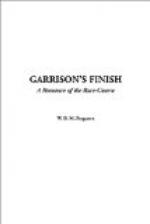“That’s the word. But I’ll start from the time the fur commenced to fly. In the first place, there’s no doubt about your identity. I was right. I’ve proved that. I couldn’t find Snark—I guess the devil must have called him back home. So I took things on my own hook and went to Cottonton, where I moseyed round considerable. I know Colonel Desha, and I learned a good deal in a quiet way when I was there. I learned from Major Calvert that his half-sister’s—your mother’s—name was Loring. That cinched it for me. But I said nothing. They were in an awful stew over your absence, but I never let on, at first, that I had you bunked.
“I learned, among other things, that Miss Desha had taken upon herself the blame of your leaving; saying that she had said something you had taken exception to; that you had gone to prove your manhood, kid. Your manhood, kid—mind that. She’s a thoroughbred, that girl. Now, I would have backed her lie to the finish if something hadn’t gone and happened.” Drake paused significantly. “That something was that the major received a letter—from your father, kid.”
“My father?” whispered Garrison.
“Um-m-m, the very party. Written from ’Frisco—on his death-bed. One of those old-timey, stage-climax death-bed confessions. As old as the mortgage on the farm business. As I remarked before some right-meaning chap says somewhere something about saying nothing but good of the dead. I’m not slinging mud. I guess there was a whole lot missing in your father, kid, but he tried to square himself at the finish, the same as we all do, I guess.
“He wrote to the major, saying he had never told his son—you, kid—of his real name nor of his mother’s family. He confessed to changing his name from Dagget to Garrison for the very reasons I said. Remember? He ended by saying he had wronged you; that he knew you would be the major’s heir, and that if you were to be found it would be under the name of Garrison. That is, if you were still living. He didn’t know anything about you.
“There was a whole lot of repentance and general misery in the letter. I don’t like to think of it overmuch. But it knocked Cottonton flatter than stale beer. Honest. I never saw such a time. I’m no good at telling a yarn, kid. It was something fierce. There was nothing but knots and knots; all diked up and tangles by the mile. And so I had to step in and straighten things out. And—and so, kid, I told the major everything; every scrap of your history, as far as I knew it. All you had told to me. I had to. Now, don’t tell me I kicked in. Say I did right, kid. I meant to.”
“Yes, yes,” murmured Garrison blankly. “And—and the major? What—did he say, Jimmie?”
Drake frowned thoughtfully.




